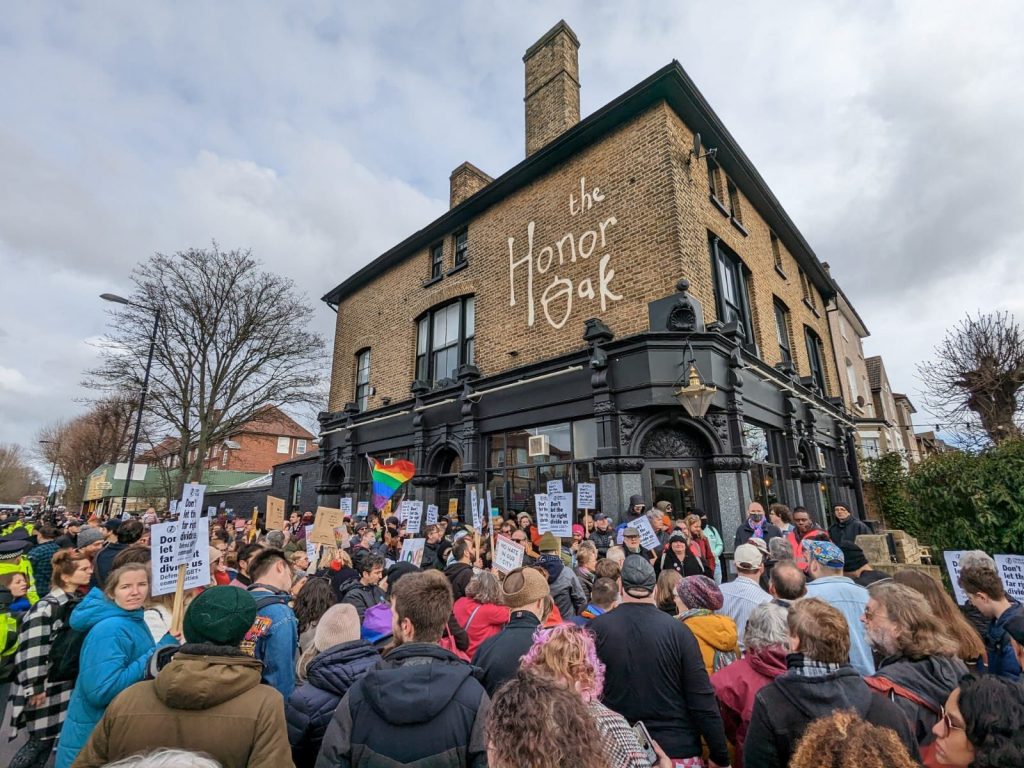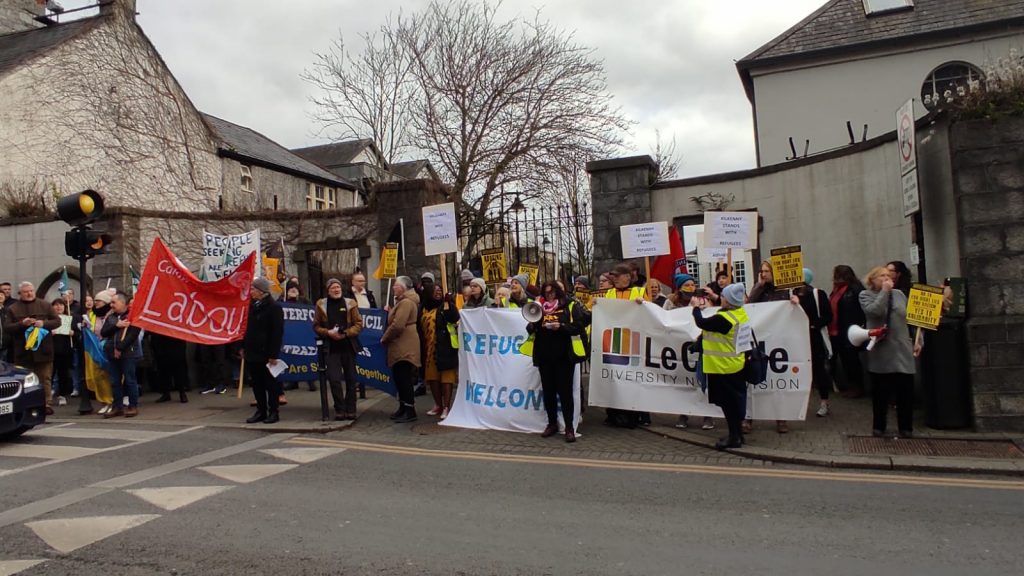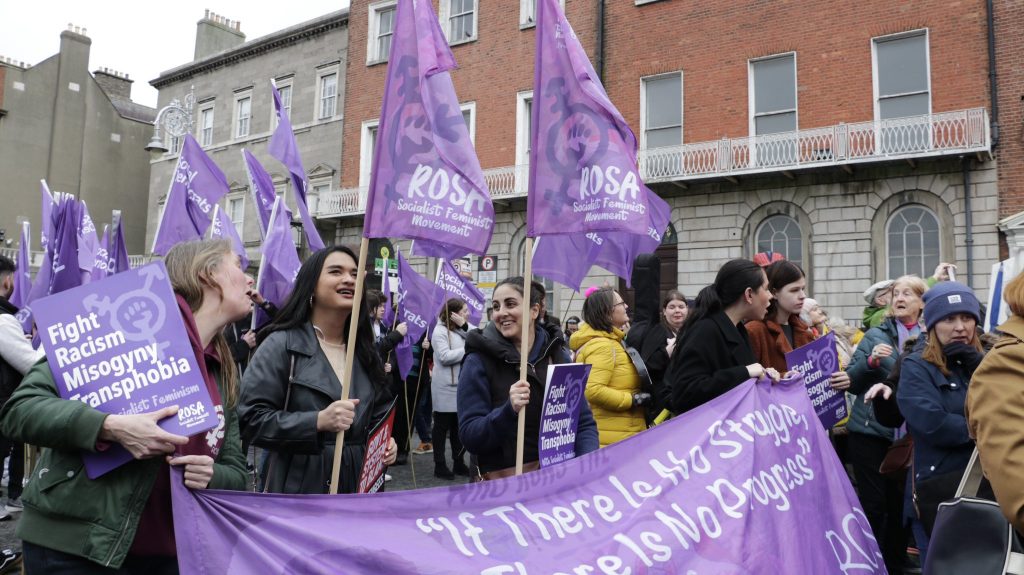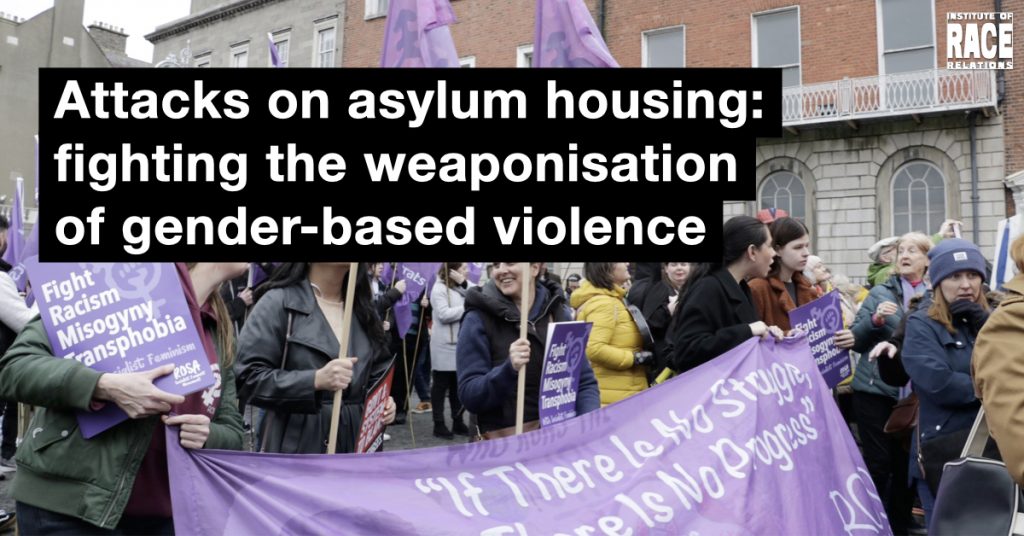Sophia Siddiqui investigates what is underpinning the violent targeting of accommodation housing asylum seekers in Ireland and across the UK and how feminists, anti-racists, migrant solidarity and trade union groups are fighting back to resist the weaponising of gender-based violence.
The eruption of violence in Knowsley, Merseyside – where supporters of the far Right orchestrated a riot, hurling lit fireworks at a hotel where asylum seekers are accommodated – is not an isolated incident, but part of a relentless far-right campaign targeting accommodation for asylum seekers. Over the weekend, further protests against asylum-seekers took place in Skegness, Newquay and Long Eaton.
And since November last year, Ireland has been in the grip of a wave of anti-immigrant demonstrations, rallying around the slogans ‘Ireland is full’ and ‘Irish Lives Matter’, with protests in Dublin, Kildare, Cork, Waterford and Westmeath leaving asylum-seekers scared, confused and re-traumatised. As further protests are planned by the far Right across the UK in the coming weeks, we need to look closely at how far-right groups are mobilising to gain footholds in local communities through a coordinated and transnational campaign.
A nation under threat? The coordinated strategies of the far Right
By tapping into fears and anxieties concerning the housing crisis, an over-burdened healthcare system and an economic crisis, the far Right are seizing the opportunity to direct blame towards a vulnerable minority, enabling anti-immigration protests to rapidly gain ground. It is no coincidence that the areas targeted are facing acute housing shortages with some of the highest levels of deprivation.
With Irish far-right organisers meeting with members of Patriotic Alternative, one of the largest far-right groups in the UK today, and Stephen Yaxley-Lennon travelling to Ireland, it’s clear that far-right groups are learning from each other in order to replicate tactics. As trade union activist Claire Mullaly, based in Belfast, tells IRR News, ‘They are using lies and myths to whip up hate, but it’s not representative of the views of these communities… there seems to be a pattern in Ireland and in the UK where the far Right bus people in and make it look like protests are by local people and local-led, but driving the protests are far-right groups’.
Videos purporting to show buses carrying male refugees arriving at hotels have fuelled protests in working-class areas in Dublin with high levels of deprivation – including Ballymun and Finglas, in the outer suburbs, and East Wall, an inner-city area becoming rapidly gentrified – with refugees left terrified by chants of ‘get them out’, ‘hang them’ and ‘burn them out’. (One such video, claiming to show refugees arriving at a school in Drimnagh, another of Dublin’s suburbs, in fact showed cleaners hired to clean before term started.)
‘The impact is huge’, said Lucky Kambule from the Movement of Asylum Seekers in Ireland (MASI), ‘it’s scary for the people who are in these centres, it’s scary for the children who are afraid [wondering] will they come for us? Will they come and shoot us?’. As an Afghani man living at the hotel in Knowsley told Care4Calais, ‘I wasn’t safe in my country and I’m not safe here’. ‘Local women do not feel safe’, reported Zlakha Ahmed, the founder of Apna Haq, a BME women’s refuge in Rotherham, where far-right protests took place outside a Holiday Inn earlier in the month. She told IRR News that women were ‘concerned that an increase in far-right activity could lead to further violence against the community’.
Huge mobilisation of far-right protestors outside a hotel for asylum-seekers in Knowsley, just outside of Liverpool. They've now set fire to a police van.
This was taken in the last hour: pic.twitter.com/HDItBlnnVY
— Benny Hunter (@BennnyH) February 10, 2023
Colonial frameworks
Obscuring the dangerous conditions of war and multiple crises that force people to flee in the first place, placards referring to the ‘plantation 2.0’ of Ireland depict a nation ‘under siege’ by immigration – a disturbing twist of the colonisation of Ireland in the sixteenth and seventeenth centuries, to depict refugees as the colonisers and white Irish people as the victims. Similarly, white ethno-nationalist rhetoric is being used to advertise anti-migrant demonstrations in the UK, including slogans such as ‘England for the English, stop white genocide’. Days before the riot in Knowsley, one of the most deprived areas in the UK, Patriotic Alternative delivered hundreds of leaflets to the area with one of its organisers holding a banner reading, ‘Europe belongs to the European’.
Far-right inflammatory language describing asylum-seekers living inside hotels as ‘military-aged migrants’ or ‘fighting-age men’ bolsters the notion of a white nation being ‘invaded’. As we know, such narratives are not confined to the far-right fringes but trickle down from the top. The day after an immigration processing centre in Dover was petrol-bombed by a far-right sympathiser last year, home secretary Suella Braverman referred to an ‘invasion’ of the south coast by refugees.
Weaponising violence against women and girls
One of the key moral panics that has provided ammunition for far-right attacks on refugees and asylum seekers is the weaponising of violence against women and girls, with misinformation spreading rapidly online with violent consequences for racialised communities. As Laura Fitzgerald from the socialist feminist group ROSA in Ireland tells IRR News:
‘The far Right are able to whip up fears around gender violence to incite marauding gangs in some deprived working-class communities in Dublin essentially based off tropes – completely racist tropes – about Black and Brown men as predators.’
In Ashtown, near Dublin, an attack on homeless migrants was driven by false claims that a refugee had been involved in a sexual assault – since denied by the gardaí who are investigating a white Irish man. In a separate incident, a man was brutally attacked after a video posted on TikTok falsely accused him of sexually assaulting patients at Dublin’s children’s hospital. And prior to the protests in Knowsley, rumours spread on social media following reports of a man, linked without proof to the hotel housing asylum seekers, making inappropriate advances towards a teenage girl, whilst far-right actors linked the protest to ‘grooming gangs’, a narrative that has harmed abuse victims and demonised whole communities.
We have also seen similar tactics in the far-right targeting of drag queen story hour events, with unfounded accusations of ‘grooming’ and ‘paedophilia’ used to demonise performers and events organisers for ‘sexualising their children’. Most recently, members of Turning Point UK were vastly outnumbered by counter-protesters at a drag queen story hour event at the Honor Oak pub in Lewisham, south-east London. ‘It’s got everything to do with dividing us’, said one counter-protester addressing the crowd, ‘it’s got everything to do with just making your neighbours seem like an enemy’.

Far-right groups have long presented themselves as the ‘protectors’ of women and children against the ‘threat’ of ethnic minority men and sexual minorities. Following the killing of Ashling Murphy last year in Tullamore, Ireland, the far Right propelled an online frenzied hunt for an immigrant suspect – disappearing the victim and turning her into a prop for a racist agenda.
But this narrative is used as a smokescreen to justify racism, whilst positioning white women as property to be defended. A leaflet circulating in Dublin, falsely attributed to a local diversity non-profit and the Irish government, instructed ‘girls to stay indoors after 6pm’ because of the dangers posed by ‘new arrivals’ who are ‘not accustomed to Irish cultural norms’. Non-white women, such as the migrant nurses who have also been targeted by protesters and racially abused on their way to work in Dublin, clearly do not qualify for such ‘protection’.
Speaking at a rally held in Dublin, Steph Hanlon of Le Chéile, an alliance combatting the far Right, refuted the weaponisation of sexual violence: ‘The far-right do not care about women, they’re not concerned about women or children. They’re using this concern as a smokescreen for spreading hate.’ As feminists have long shown, gender-based violence is a systemic issue, unfortunately affecting all communities, and cannot be solely attributed to those from a specific ethnicity or race.
The role of the state: a crisis in the making
Accommodation for asylum-seekers has long been an easy target for far-right campaigns across Europe. Dispersal policies isolate refugees from any community or family they may have, and often place them in deprived areas. And the increased use of hotels since the pandemic, often hired at short notice and with little or no local consultation, provides fertile ground for resentment that can be preyed upon by the far Right and redirected at asylum-seekers. As Daniel Trilling writes, ‘a[n asylum] system that treats its subjects as unwanted material to be tidied away is always likely to breed stigma’, which, when combined with the state’s attitude to asylum-seekers, inevitably leaves them vulnerable to racial attack.
Research shows that so-called ‘migrant hunters’ made 253 visits to hotels housing asylum seekers in the UK in 2022, more than double the figure from 2021. This is not unique to the UK and Ireland. In Germany, at least sixty-five attacks on refuge shelters have occurred in less than a year, with at least two asylum-seekers a day being subject to attacks.
How have governments responded? The presence of migrants and refugees continues to be presented as the reason for the surge in anti-immigrant violence, a view upheld by the mainstream media – a form of victim-blaming which then justifies the implementation of further immigration controls. The Irish Minister for Justice has promised to accelerate the deportation of ‘failed’ asylum-seekers. And in the UK, Braverman’s response to the violence has been widely condemned for implying that the demonstrators were responding to legitimate concerns, and ‘understandable tensions’. A daytime curfew has since been imposed on asylum-seekers in the Suites hotel in Knowsley – a measure which frames asylum-seekers as the problem and further adds to their social exclusion and stigmatisation.

‘Migrant rights and women’s rights, same struggle, same fight’
The targeting of asylum-seekers has not gone unresisted. Anti-racist, anti-fascist and feminist groups and local people in Ireland and across the UK have been tirelessly organising counter-protests that confront far-right messaging through a variety of tactics.
One of the key strategies for building a progressive Left movement that takes on the far Right – their racism, their sexism and misogyny, their transphobia – is raising consciousness about the roots of gender violence, in order to ensure that the issue cannot be exploited by the Right. Feminists in Ireland are organising mass leaflet drops, political education workshops and protests planned around International Women’s Day, in order to get the message out that ‘gender-based violence has nothing to do with race, nationality, citizenship status, and has everything to do with machismo and sexism – exactly the ideas that typify the far Right’, as explained by Laura from ROSA.
In Dublin, a mass demonstration took place in the city centre on 4 February to stand in solidarity with those being victimised by the far Right as well as to denounce their lies and misinformation. ‘Migrant rights and women’s rights, same struggle, same fight’ was one of the rallying chants.
And later in the month, up to 50,000 people took to the streets in an immensely powerful anti-racist protest, under the banner of ‘Ireland for all’ including a broad coalition of groups organising around migrant, LGBTQ and women’s rights, health workers, plus many trade unions including the Services, Industrial, Professional and Technical Union (SIPTU), the Teachers Union of Ireland, the Communications Workers Union (CWU), plus several others.
Trade union activist Claire Mullaly, along with a large contingent of people travelled from Belfast to Dublin to participate in the march:
It was amazing… it brought together ordinary mums, trade union members, civil society groups, political parties, and groups like Trans and Intersex Pride Dublin … it was very intersectional, and this absolutely represents the working class. The far right’s argument that they represent the working-class is now lost.


